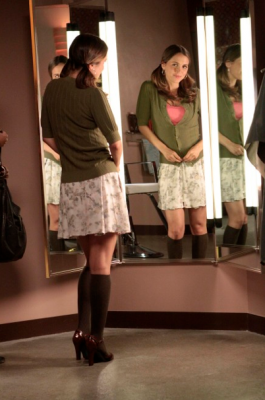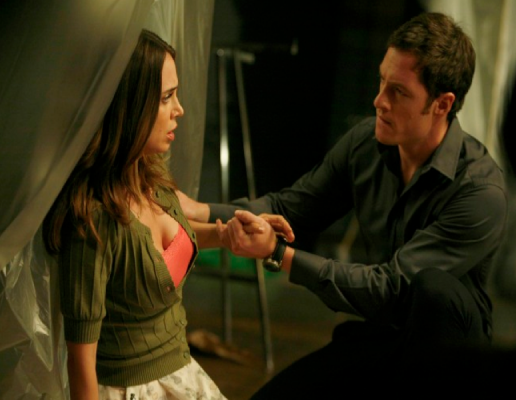
Episode: Dollhouse 2.03 – “Belle Chose”
Original Airdate: October 9, 2009
Last week’s episode of Dollhouse, 2.03, “Belle Chose”, revolves around some very deep-seated issues. As always, the themes of power and control are constantly examined and reexamined; it would be impossible to create a show like Dollhouse without doing so given the premise of the series. However, this episode also deals with some significant gender issues as well. Though the Dollhouse appears at first glance to be a progressive environment headed by a powerful woman like Adelle DeWitt (Olivia Williams), some of DeWitt’s most crippling insecurities are aired in season one (1.07, “Echoes”; 1.09, “A Spy in the House of Love”) shortly before both Ballard (Tahmoh Penikett) and Alpha (Alan Tudyk) make their way into the Dollhouse, nearly bringing the organization down in the process. As you can see, season one establishes DeWitt’s personal flaws, one of which is romantic, and then links them with her failure to prevent the havoc wreaked by Ballard and Alpha. So much for “progressive”.
In season two, Dollhouse continues to explore the relationship between power, control, and gender with episodes 2.01, “Vows”, and 2.02, “Instinct”. The season premiere highlights the insanity that results when power, control, and gender collide within a single individual, specifically Dr. Saunders (Amy Acker). Acker’s character is driven to drink after she discovers in the end of season one that she is Topher’s creation: a constructed personality based on a deceased male doctor and former Dollhouse employee now inhabiting the female body of a visibly disfigured former Dollhouse active (Whiskey). In episode 2.02, the concepts of biological human processes are under attack when Topher (Fran Kranz) programs not just Echo’s (Eliza Dushku) mind, but her body as well.

Episode 2.03, “Belle Chose”, takes the gender theme even further, highlighting how constructed our concepts of “male” and “female” are when the mind of a male serial killer is dumped first into Victor’s (Enver Gjokaj) body and then accidentally transferred into Echo’s. Echo’s intended engagement also provides a platform for contemplating the connections between gender and power: programmed to be a college coed named Kiki, Echo is scheduled to be the sexual conquest of a wealthy college professor. On one hand, this (male) professor is intent on teaching his (female) “student” the extent of the power that she inherently holds based on her gender. This smacks of second wave feminism, but on the other hand we’re dealing with a male college professor who has the power and money to pay the Dollhouse to provide him with a female student—one who is none too intelligent, I might add—that he will be able to seduce successfully.
At the same time, DeWitt and Ballard are faced with another problem, this one inside the walls of the Dollhouse. When Topher is tasked with awakening a coma patient for an important Dollhouse shareholder (Battlestar Galactica‘s Michael Hogan), DeWitt and Boyd end up with a serial killer on their hands. DeWitt pulls Ballard off of Echo’s “hot for teacher” engagement and recruits his help in interrogating their resident comatose psychopath, Terry Karrens (Joe Sikora). For what may be the first time in the show’s history we are given an opportunity to see Tahmoh Penikett truly shine as his character, Paul Ballard, puts his FBI training to use interrogating Karrens, whose mind is dumped into Victor for this purpose. In my opinion, the Paul Ballard that viewers were introduced to in season one was not the most developed of characters; his motives were translucent, his purpose known, and his life accessible to Dollhouse audiences. In season two, however, a new side of Paul Ballard is emerging; even though he is still a prime example of chivalry, Ballard has room to move beyond this characterization now that his FBI shackles are removed. The transition that Ballard has undergone thus far this season—from an FBI agent to a Dollhouse client and finally to a handler—serve as an interesting illustration of the various power roles available to someone in his position.

Credit must also be given to Enver Gjokaj for his performance in last week’s episode of Dollhouse. Although both Victor and Echo are vehicles for gender and power play, Victor is the more overt and entertaining example. Gjokaj’s ability to emulate Joe Sikora’s character in “Belle Chose” is impressive enough, but his version of Kiki, Echo’s imprint, is downright priceless. Interestingly, Victor’s performance as Kiki in this episode raises questions not only about gender, but sexuality as well. A couple of very masculine men mistake a very feminine woman (Kiki) trapped in a man’s body (Victor) for a gay man in a nightclub, emphasizing popular conceptions of sexuality and gender relations.
While the first season of Dollhouse made no bones about the extent of Topher’s control over the actives, season two seems hell-bent on establishing the power that Topher actually has in the Dollhouse. While he may take orders from DeWitt in the casual sense, it is Topher who really holds all of the power in the Dollhouse—he is the one who solves many of the problems that arise (whether or not we realize it), he is the one who fine-tuned the imprinting process and made it what we see on a weekly basis, and he is the one who now has control over not only the mind, but the body as well. Even though Alan Tudyk’s character is named “Alpha,” I would argue that Topher is the real Alpha (and Omega) of the Dollhouse. It will be very interesting to see where Joss Whedon intends to take Dollhouse this season. Hopefully we will get a chance to find out.
Episode 2.03, “Belle Chose,” was written by former Firefly and Angel scribe Tim Minear, who is also a producer for the show. Directed by David Solomon (Las Vegas, Buffy the Vampire Slayer), “Belle Chose” aired on Fox on Friday, Oct. 9th at 9/8c. For more information on the show, check out the official Dollhouse web site and be sure to tune in for episode 2.04, “Belonging,” on Friday, Oct. 16th at 9/8c on Fox.
Rating: 4 / 5 Stars






